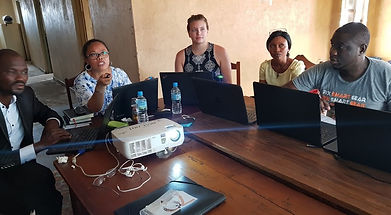Translation
Bible translation is a very time consuming and difficult task. Not only must the words be translated, but they must be understood in the context in which they are received. There are a number of steps to take in order to translate Scriptures into someone's heart language.
Drafting
The first step (after a project is created, translators are found and trained, and the purpose of the translation is identified) is to make a draft translation into the target language, in this case Mende. This is done by translating from languages such as English, French, Arabic, other languages with Bible translations, and related languages with a translation. This allows mother-tongue translators, Mende speakers from Sierra Leone, to translate without needing to know the Greek of the New Testament or Hebrew of the Old. Although translators are working in languages they know, this process is difficult. Sometimes the original script doesn't have an equivalent in Mende, or the equivalent has different connotations that can change the meaning of the translation. Other literary aspects such as metaphors, similes, and idioms also cause challenges because they often require a similar cultural background to understand.


Exegetical Check
This part of the process includes comparing the work of the translators with the Greek and Hebrew testaments. This step is important because sometimes translations use idioms not included in the original or they change the way something is said in order for the target language group to understand. So when translators translate from translations, it is important to compare with the original to see if there are inconsistencies that are not necessary, since the target language may be more closely related to the original language or culture than the text and culture used to translate the first draft. Exegetical checks also include working with commentaries to understand the original context of the Bible in order to better translate the meaning into another language. Exegetical work can occur before, during, and after the draft is completed.
Community Check
The community check is concerned mostly with checking the translation for accuracy, clarity, and naturalness. To accomplish this, the translation is read to a group of Mende speakers and then followed up with questions that test what people understood from the verses and what they thought the purpose of the reading was. Languages have different ways of showing which characters and themes are important and ways of moving from one part of a discourse to another. So it is important to test not only what the verses are saying, but what the readers think the theme is and who they think is important. Community checking also includes people reading the translation to hear where people stumble or sound unsure. This gives clues to where the translation needs work on naturalness or clarity. If a translation is difficult to understand or read, they will not be as willing to read it. Though the Scriptures are from a foreign land and culture to most, they still need to be understood similar to a text coming from their own culture.
Consultant Check
After many other checks a consultant, who has much experience in translation, will work with a back translation to check common translation issues, linguistic issues, and ask questions about particular ways verses were translated. A back translation is when a translation has been translated back into a language known both by the translation team and the consultant. This allows consultants to check translations without having to know the target language in detail, which allows consultants the ability to consult on more than one project. After revisions have been made, portions of Scripture will be distributed for people to use and continue to give feedback about the trasnslation. Eventually once the entire testament or Bible is complete, the whole translation will be sent to a publisher for printing. This is then followed by a Bible dedication filled with joy, tears, and hope!


Stories of real translation projects...
How to get involved...
There are many ways to get involved with Bible translation, including many that don't include learning Greek and Hebrew ;)
-
Right now, regardless of where you are or what you are doing, you can pray for Bible translation, for the progress of Bible translation and its effectiveness across the world. Click here for more ways to pray for Bible Translation.
-
Another way to be involved in Bible translation is to financially support missionaries in Bible translation: https://lbt.org/project/amy-formella/
-
Translation advisors work most closely with Bible Translation, working in commentaries and comparing translations with the Greek and Hebrew texts. Often project management and teaching skills are also used.
-
People who work in Scripture Engagement work with the community to encourage use of Scriptures in ways people best understand, such as through being read out loud or acting it out.
-
Literacy workers partner with local people to increase literacy in their mother tongue. This is important not only for reading the Bible in their heart language, but to assist people in school and preserve their language and culture.
-
Other positions include working with IT, being a homeschool teacher and caretaker for missionary children, working with media to create audio Bibles, studying local music and helping to record local music and create Christian music inspired by the local music.
To learn more about these positions please go to https://lbt.org/go/.
***Many of these skills can be learned with training, so if you are interested do not be afraid to inquire. Contact me or contact our recruiter Emily Wilson at recruiter@lbt.org.




